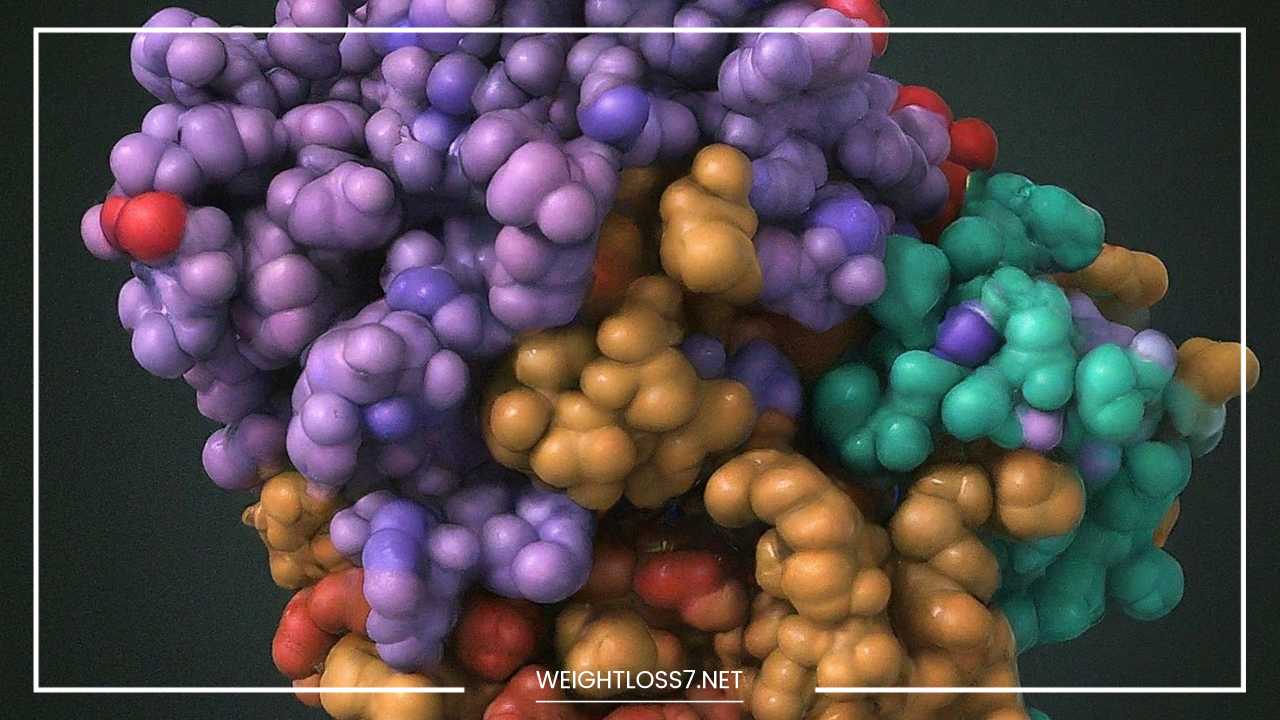Leptin: Your Body’s Natural Weight Management System – Explained

Leptin
Leptin: The Complex Maestro of Your Appetite and Weight
Leptin. A single word with a powerful impact on our bodies. Often hailed as the “satiety hormone,” leptin plays a critical role in the intricate dance between hunger, fullness, and weight management.
But understanding leptin goes beyond just its basic function.
This comprehensive guide delves into the world of leptin, exploring its intricate mechanisms, the challenges of resistance, and evidence-based strategies to keep it functioning optimally.
The Symphony of Leptin: A Multifaceted Maestro
Leptin’s story begins within your fat cells, also known as adipocytes. As these cells grow and store more energy, they secrete leptin into the bloodstream.
This hormone then embarks on a journey to the hypothalamus, the control center in your brain responsible for regulating hunger, satiety, and energy expenditure. Upon arrival, leptin delivers a crucial message: “We have enough energy in reserve!”
This message triggers a cascade of effects:
- Appetite Suppression: Leptin signals the hypothalamus to decrease the production of neuropeptide Y (NPY), a potent stimulator of hunger. This leads to feelings of fullness and a decreased desire to eat.
- Energy Expenditure Boost: Leptin also influences the release of thyroid-stimulating hormone (TSH), which in turn stimulates the thyroid gland to produce thyroid hormone. This hormone plays a vital role in regulating metabolism, increasing the rate at which your body burns calories.
- Fat Storage Regulation: Leptin inhibits lipoprotein lipase, an enzyme responsible for fat storage. This helps prevent excessive fat accumulation.
The Intrigue of Leptin Resistance: When the Message Gets Lost
In an ideal world, leptin’s communication with the brain keeps our weight in check. However, sometimes things go awry. This is where leptin resistance comes in.
Here, despite having sufficient leptin levels, the brain fails to receive or interpret the “full” message effectively.
Consequently, the body continues to send hunger signals, leading to increased calorie intake and potential weight gain.
The Culprits Behind Leptin Resistance:
Several factors can contribute to leptin resistance, including:
- Chronic Inflammation: Ongoing inflammation can disrupt leptin signaling pathways. Conditions like obesity, fatty liver disease, and certain autoimmune diseases are often associated with elevated inflammatory markers.
- Dietary Choices: Diets high in processed foods, sugary drinks, and unhealthy fats can impair leptin sensitivity. These foods can lead to chronic inflammation and disrupt hormonal balance.
- Sleep Deprivation: When sleep-deprived, your body produces less leptin and more ghrelin (the hunger hormone). This hormonal imbalance can lead to increased appetite and difficulty managing weight.
- Stress: Chronic stress elevates cortisol levels, a hormone that can antagonize leptin’s actions and contribute to resistance.
Restoring Harmony: Strategies to Address Leptin Resistance
The good news is that leptin resistance isn’t a permanent roadblock. By implementing some lifestyle changes, you can support your body’s natural ability to hear and respond to leptin’s signals effectively:
- Embrace a Balanced Diet: Focus on whole, unprocessed foods like fruits, vegetables, lean proteins, and whole grains. These foods are rich in nutrients and fiber, both of which can improve leptin sensitivity.
- Prioritize Protein: Protein is known for its satiating properties. Including lean protein sources like chicken, fish, legumes, and nuts in your meals can help keep you feeling fuller for longer and reduce overall calorie intake.
- Don’t Skip Meals: Skipping meals can lead to spikes in ghrelin, further fueling hunger pangs. Aim for 3 balanced meals and healthy snacks throughout the day to maintain stable blood sugar levels and leptin sensitivity.
- Befriend Fiber: Fiber adds bulk to your meals, promoting satiety and preventing overeating. Include fruits, vegetables, and whole grains rich in fiber in your diet.
- Manage Stress: Chronic stress disrupts hormonal balance. Practice stress-reduction techniques like yoga, meditation, or deep breathing to improve overall health and leptin sensitivity.
- Prioritize Sleep: Aim for 7-8 hours of quality sleep each night. Adequate sleep allows your body to regulate hormones effectively, including leptin and ghrelin.
- Maintain a Healthy Weight: While losing weight can lead to temporary declines in leptin levels, focusing on gradual and sustainable weight loss promotes long-term leptin function.
- Consider Healthy Fats: While excessive saturated and trans fats can contribute to leptin resistance, including healthy fats like those found in avocados, olive oil, and nuts may improve leptin sensitivity. However, consult a healthcare professional regarding specific dietary recommendations.
Beyond Hunger and Weight: The Broader Role of Leptin
Leptin’s influence extends beyond just appetite and weight management. This multifaceted hormone plays a crucial role in various bodily functions, including:
- Bone Health: Leptin interacts with osteoblasts, cells responsible for bone formation. Studies suggest leptin deficiency can contribute to decreased bone mineral density and an increased risk of osteoporosis.
- Immune Function: Leptin plays a role in regulating the immune system. It can influence the activity of immune cells and may contribute to the body’s defense against infection.
- Reproduction: Leptin levels influence fertility in both men and women. Adequate leptin is necessary for normal reproductive function and hormone regulation.
- Wound Healing: Leptin promotes wound healing by stimulating the production of growth factors and promoting cell proliferation.
- Regulation of Blood Sugar: Leptin interacts with insulin, a hormone responsible for regulating blood sugar levels. Some studies suggest leptin may play a role in preventing insulin resistance, a precursor to type 2 diabetes.
The Delicate Dance of Leptin and Ghrelin: A Balancing Act
Leptin’s role as the satiety hormone is counterbalanced by ghrelin, often referred to as the “hunger hormone.” Produced by the stomach, ghrelin stimulates appetite and promotes food intake. Ideally, these two hormones work in a coordinated dance, keeping your hunger and fullness cues in check.
However, factors like chronic stress and unhealthy dietary patterns can disrupt this balance, leading to increased ghrelin levels and difficulty managing weight.
Strategies to Reduce Ghrelin and Enhance Leptin:
Here are some strategies to promote a healthy balance between leptin and ghrelin:
- Eat Regularly: Don’t skip meals, as this can lead to spikes in ghrelin. Aim for consistent mealtimes and healthy snacks throughout the day.
- Focus on Protein: Protein has a satiating effect and can help suppress ghrelin production. Include lean protein sources in your meals.
- Fiber is Your Friend: Fiber slows down digestion and keeps you feeling fuller for longer, helping to regulate ghrelin levels. Choose fiber-rich fruits, vegetables, and whole grains.
- Manage Stress: Chronic stress elevates cortisol levels, which can stimulate ghrelin production. Practice stress-management techniques to maintain hormonal balance.
The Leptin Controversy: Supplements and Ethical Considerations
With the growing interest in leptin’s role in weight management, leptin supplements have emerged. However, there’s a lack of conclusive evidence supporting their effectiveness in promoting weight loss or improving leptin sensitivity in individuals with normal leptin levels.
Here are some key considerations regarding leptin supplements:
- Limited Research: Current research on leptin supplements is limited, and their long-term safety and efficacy haven’t been established.
- Potential Side Effects: Leptin supplements may have side effects, including nausea, headaches, and fatigue.
- Addressing the Root Cause: Leptin resistance often stems from lifestyle factors like poor diet, sleep deprivation, and stress. Addressing these underlying issues is likely more effective than relying solely on supplements.
The Ethical Dilemma: Leptin’s role extends beyond weight management. Artificially manipulating leptin levels, especially with limited scientific understanding, could potentially disrupt other important bodily functions.
Unveiling the Mysteries of Leptin: Research Frontiers and Future Directions
The world of leptin research is constantly evolving, with scientists delving deeper into its intricate mechanisms and potential therapeutic applications. Here’s a glimpse into some exciting frontiers:
Leptin and the Microbiome: The gut microbiome, the vast community of microorganisms residing in our intestines, plays a crucial role in overall health and metabolism.
Emerging research explores the potential link between the gut microbiome and leptin sensitivity. Studies suggest that certain gut bacteria may influence leptin production and signaling. Understanding this connection could pave the way for novel therapeutic strategies to improve leptin function.
Leptin and Precision Medicine: Precision medicine tailors treatment plans to an individual’s unique genetic makeup and health profile. Future research on leptin may explore its role in personalized weight management strategies.
Identifying genetic variations that influence leptin sensitivity could help healthcare professionals create customized plans to optimize leptin function for each patient.
Leptin and Metabolic Disorders: Leptin dysfunction is implicated in various metabolic disorders, including type 2 diabetes, polycystic ovary syndrome (PCOS), and non-alcoholic fatty liver disease (NAFLD).
Further research on leptin’s role in these conditions could lead to the development of targeted therapies that address the underlying leptin resistance and improve overall metabolic health.
Leptin and Brain Health: Recent studies suggest leptin may play a role in cognitive function and neurodegenerative diseases like Alzheimer’s disease. Investigating the link between leptin and brain health could open doors for new therapeutic approaches to protect brain function and potentially prevent cognitive decline.
Ethical Considerations in Leptin Research: As leptin research advances, ethical considerations remain paramount.
Developing safe and effective leptin-based therapies requires careful evaluation of potential side effects and long-term consequences of manipulating leptin levels.
Final Word: Optimizing Leptin Function for Overall Well-being
Understanding leptin and its complex role in our bodies empowers us to make informed choices about our health. By prioritizing a balanced diet, regular sleep, stress management, and a healthy weight, we can support our body’s natural ability to regulate leptin effectively.
Remember, a holistic approach is key. Focusing on overall well-being, not just weight loss, is essential for optimizing leptin function and promoting long-term health.
Disclaimer: This information is for educational purposes only and is not intended to be a substitute for professional medical advice. Always consult with a healthcare professional before making significant changes to your diet, exercise routine, or taking any supplements.

















